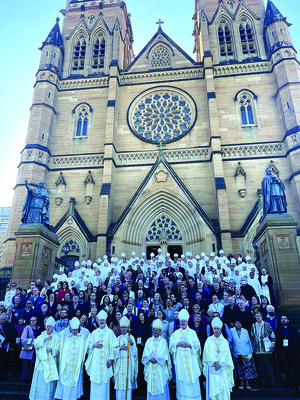01 Aug 2022
Council united in mission
The Southern Cross August 2022

After four years of discernment, the historic Fifth Plenary Council of Australia last month passed 35 motions aimed at helping the Church in Australia to be more missionary and Christ-centred.
Council president Archbishop Timothy Costelloe SDB declared the final assembly closed on July 9, prompting a lengthy standing ovation from members after a week of intense and at times difficult deliberations.
This followed unanimous support for a concluding statement which described the Council as an “expression of the synodality that Pope Francis has identified as a key dimension of the Church’s life in the third millennium”.
‘Synodality is the way of being a pilgrim Church, a Church that journeys together and listens together, so that we might more faithfully act together in responding to our God-given vocation and mission,’ the statement said.
Signed by all 277 members, the statement also acknowledged that while some moments during the week had been ‘calm and harmonious’, others were ‘tense and difficult’, but ‘every moment has been blessed; the entire week has been grace-filled, though never a cheap grace’.
‘The Holy Spirit has been both comforter and disrupter.’
Council members confirmed the decrees of the Fifth Plenary Council of Australia, which were then signed by all bishops present. After the November meeting of the Australian Catholic Bishops Conference, the decrees will be sent to the Holy See for review.
During the assembly, spiritual conversations on the various motions were preceded by the question ‘how does this help the Church in Australia to be more missionary and Christ-centred?’
On the third full day of the assembly, two motions relating to the role of women in the Church did not pass and about 60 members protested spontaneously by not returning to their tables. A four-person writing group was established to receive recommendations from members for the drafting of revised motions. The new motions received overwhelming support on the last full day of the assembly.
On the same day, members also passed a series of motions in Part 5, ‘Communion in Grace: Sacrament to the World’, and Part 6, ‘Formation and Leadership for Mission and Ministry’.
They included asking the Holy See to consider the use of the Third Rite of Penance in certain circumstances, review of the ministry of preaching and the development of formation programs.
The only motion not passed was a recommendation to request an amendment to Canon Law to enable, where appropriate, ‘those entrusted with this ministry of preaching to preach in the Eucharistic assembly’.
The assembly agreed that the Bishops Commission for Liturgy should prepare a new English translation of the Roman Missal that is ‘both faithful to the original text and sensitive to the call for language that communicates clearly and includes all in the assembly’.
Earlier in the week, members voted in favour of motions aimed at strengthening the Catholic Church’s commitment to First Nations people including developing options for the appropriate use of their symbols and rituals in Catholic liturgies.
This followed a liturgy of lament and moving testimonies from Indigenous members about the meaning of their rituals and culture as well as the importance of the Church “walking with us”.
“Today's motions will help to bring Christ to our children, the next generation,” Mary O’Reeri said.
“We can do it together and let's bring it on.”
The assembly supported motions on ‘Choosing Repentance – Seeking Healing’, which included saying sorry to the victims and survivors of abuse, their families and communities, and recommitting the Church to respond with justice and compassion to those who have suffered from the trauma of abuse.
In his homily at the concluding Mass in St Mary’s Cathedral, Archbishop Costelloe said members had “tried to reimagine the Church in Australia through a missionary lens: to dream of how we, together, can better witness to all that God has done, and continues to do”.
“The implementation phase will now make new demands upon us. We will have as much need of the Holy Spirit in moving forward as we have had up until now,” he said.
